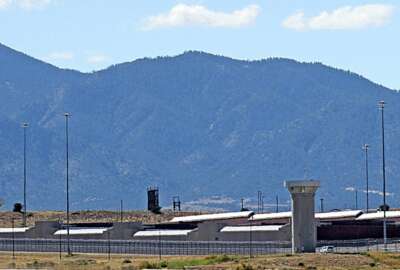
A one-time inmate shows the federal prison system can — and often does — achieve its mission
he BOP Mission Statement also references "custody and care, not jails and guards." Federal Drive with Tom Temin takes a look a look at one success. Eddie Ellis...
Follow the rest of Federal News Network’s series, The Worst Place to Work in the Federal Government.
This interview is sort of postscript to the Federal Drive series, The Worst Place to Work in the Federal Government. The focus, thus far, has been on the Federal Bureau of Prisons, part of the Justice Department. The Bureau’s stated mission, in part, is, “To provide reentry programs to ensure inmates’ successful return to the community.” The BOP Mission Statement also references “custody and care, not jails and guards.” Federal Drive with Tom Temin takes a look a look at one success. Eddie Ellis was convicted of manslaughter, did part of his sentence in the Florence, Colorado, super-max prison, and returned to society. He now works for juvenile-sentencing reform. This is a personal, intimate, and instructive interview.
Interview Transcript:
Tom Temin And just give us the brief outlines of your life that led to prison and back out of it.
Eddie Ellis Okay. Thank you. As a young person I was caught up around the wrong things at times, and I ended up getting in trouble at the age of 16. Someone pulled a gun on me and I had a gun and I defended myself and they unfortunately lost their life that day. And I take full responsibility for what took place that day. But as a 16 year old child, I didn’t understand what was taking place, what was happening. I was confused about everything. And as a child, I lost my father to gun violence. And sometimes in these situations, hurt people can still hurt people. And as a child, that’s what ended up happening. Someone got hurt because of my actions.
Tom Temin And so you were tried and convicted as a juvenile.
Eddie Ellis As an adult.
Tom Temin That is to say, you were juvenile age, but tried and convicted as an adult.
Eddie Ellis Yes. I was 16 years old when I was arrested. I was Title 16 and charged as an adult.
Tom Temin And then what happened? Where were you sentenced to?
Eddie Ellis I faced 75 years to life, found guilty of manslaughter. Because of the victim impact statement, the judge ended up giving me 22 years instead of like 35, 40 years because the victim impact statement asked the judge to have leniency on us because we were children. And that’s what the judge did. And I ended up serving 15 years in prison, seven years on parole, and I’ve been home since 2006.
Tom Temin Now, you went to which prison? Initially?
Eddie Ellis Initially, I went to DC jail and I went to Lorton. When Lorton was still open in Lorton, Virginia. Then I was transferred to Youngstown, Ohio, to a privatized prison there. They sent us back to Lorton, to the supermax unit where that was still open. Then I went to Red Onion in Pound, Virginia. Then from Red Onion, I was sent to the supermax in Florence, Colorado.
Tom Temin What transpired to get you from there to Florence? Because that’s where the really tough people go and it’s all day solitary, etc., etc..
Eddie Ellis Yeah, well, D.C. prisons were closing. They were only able to send you to prisons that were still open. And if you had max custody on you when you be sent out to other prisons, you continue to have that max status on you. And that’s why I was sent to Red Onion. But over the years, I got in fights to defend myself and protect myself at time, but because I still had that max status on me and I was sent to Red Onion, and then from Red Onion, I was sent to supermax, and I stayed there from 2000 to 2006. And I went to Lewisburg for my last days and I came home.
Tom Temin And how would you describe the experience in terms of the staff of prisons as a, for lack of a better word, their customer, their client as an inmate? What’s your overall experience there? I mean, they must vary a lot, but some guards did try to help, didn’t they?
Eddie Ellis Yeah, it varies. I said I always said is you always have bad apples everywhere. But I met a few people there that work there who were good people who treated me like a human being. Understand that the bad choice that I made as a 16 year old child didn’t have anything to do with them, and they were professional enough to address me as a human. And I really appreciated that and I always talk about those in the system who I ran across those who were good people.
Tom Temin We’re speaking with Eddie Ellis. He’s a former Bureau of Prisons inmate, now director of outreach at the Campaign for the Fair Sentencing of Youth. And in the supermax, I mean, that’s a notorious place. Even the former warden has been on television over the years talking about it. We know some, El Chapo is there and so forth and some of the traitors to the country, from the intelligence community and the FBI. And people are 23 hours locked up. And when you are outside, it’s like in the bottom of a swimming pool. And there’s lots of detail you can find out about that particular facility. But yet you found from the warden all the way down to some of the staff that there was caring even in the supermax?
Eddie Ellis You have people in places that still can care despite the places that they end. And I just tried to just do my time and deal with people when I needed to deal with them. And I stayed out the way and I just prepared myself because I knew that prison couldn’t change me. I had to change myself in order to come out here in the world and do the things I’m doing today. So that’s what I did. Any program that I was allowed to take, I took the programing. Started to change the way I read, who I communicated with, and I changed my life. But I tell people all the time, well, prison is nothing but a building. And if you sit in there without doing anything, you will not prepare yourself. But I prepared myself to be out here almost 17 years later.
Tom Temin And in recent years there has been statutory requirements from Congress for the Bureau to offer programs to make sure that people don’t come back and try to help train them for life outside again. Was there any kind of programing in those days?
Eddie Ellis No, not when I came home. I’m going to be honest with you, the program they gave me was banking skills and I didn’t have no money to put in the bank. So it was useless to me. But I prepared myself. Like I say, I prepared myself the best way that I could have. I made sure my mind was in the right places. Again, continue to read things that was helping me prepare for the world as much as you can. Communicate with my family and loved ones about things that I wanted to do when I come home. And when I came home, that’s what I did. I stayed on track and I’ve been advocating for programs to go back in the federal prison, in prisons to help people.
Tom Temin Sure. And what’s your best advice for prison staff, again, from the standpoint of an inmate and we’ll call it a client right now, because the ones I’ve spoken to do have some sense of mission about this. They don’t see the prisoners as undifferentiated masses either.
Eddie Ellis I just say we understand that some people are there for choices they made and some people are not. Treat people like you want to be treated. And and that’s it. Because the reality of prison is this: There’s more of us inside of a jail than it is guards at any time. And I tell people, 90% of people in jail don’t want to get in trouble again. They don’t. They want to do something different. But it’s environmental things that don’t allow them things to happen sometimes. Just think about some people who are in the Federal Bureau of Prisons who were juveniles. They’re sentenced to life without parole. Who can’t get certain programs in prisons because they got life without parole. How do those people prepare themselves? Are we going to create opportunities for those people who were children, 17 and younger, to get an opportunity to come home? As long as we prepare people to come home, we given them the resources that they need. But if we’re not giving them resources, how do we expect people to do what most college kids can’t do without resources?
Tom Temin So the work you’re doing is more upstream of the prison system itself in the area of sentencing and the deliverance of justice.
Eddie Ellis Yeah, I think the work that we do is trying to ban life without parole nationally for children. They’re 17 and younger. And with those bills is filed, we’re not saying that children shouldn’t be held accountable, but appropriate accountability. And if a child make a horrible decision, they’re not today, now an adult. They’re still a child. There’s things that we can do to help in these situations. And we got almost a thousand people home that was sentenced to life without parole as children who are doing wonderful work. I work with a lot of people across the country. I work with over 240 people who were sentenced to extreme sentences as children across the country who are doing wonderful work in the community. And I feel like the work that we do, it makes us feel a part of the community. It’s something that we want to do.
Tom Temin And so people that could be sentenced as juveniles and if they get parole in that sentencing, they are there for in the federal prison system with a chance of getting out at some point. And that’s what you feel where the delivery of these kinds of services, education, help to get them to that parole point and then stay out.
Eddie Ellis Yes, as we know, education opens up another world for us. And if we prepare them the way that we can as a system we can prepare them to come home in ways of going to jobs, to coming home and being law abiding citizens living their life however they choose to live it in a positive way. But again, if we’re not putting resources there for them to do that, then it’s kind of like talking out both sides of our head. We want the community to be safe, but yet we choose not to put the resources there to help a person prepare themselves. So again, I prepared myself. The system didn’t do it, and I’m proud of who I am with the support I’ve had. And I’m going to do the work that I’m doing to advocate until the day I die.
Follow the rest of Federal News Network’s series, The Worst Place to Work in the Federal Government.
Copyright © 2025 Federal News Network. All rights reserved. This website is not intended for users located within the European Economic Area.
Tom Temin is host of the Federal Drive and has been providing insight on federal technology and management issues for more than 30 years.
Follow @tteminWFED





